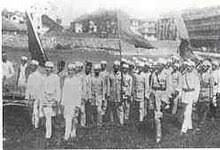The Khilafat Movement was a political and religious movement in India in the early 20th century, focused on preserving the status of the Ottoman Empire’s Caliphate, or Islamic spiritual leadership. The movement was led by Indian Muslim leaders and was part of a larger non-violent resistance movement against British rule in India.

Table of Contents
History of Khilafat Movement
The Khilafat movement was launched by the Ali brothers, Maulana Mohammad Ali Jauhar and Maulana Shaukat Ali, in 1919. The brothers were prominent Muslim leaders and activists who were deeply concerned about the British government’s decision to abolish the Ottoman Caliphate. They believed that the caliphate’s abolition would weaken the Islamic world and hurt the religious sentiments of Muslims worldwide. They decided to launch a mass movement to protest the decision and create a united front of Indian Muslims.
The Khilafat movement gained momentum when Mahatma Gandhi joined it in 1920. Gandhi believed that the Khilafat movement could be a powerful force to unite Hindus and Muslims in India and create a common platform for the country’s independence movement. Gandhi saw the Khilafat movement as a way to promote Hindu-Muslim unity and create a united front against British colonialism.
Significance of the Khilafat Movement
The movement had several significant impacts on Indian society and politics. Firstly, it helped to create a pan-Islamic identity among Indian Muslims. The Khilafat movement emphasized the importance of Islamic unity and created a sense of community among Muslims. The movement also helped to establish close ties between Indian Muslims and their counterparts in the Middle East and other parts of the Islamic world.
Secondly, the movement was instrumental in promoting Hindu-Muslim unity in India. The movement brought together Hindus and Muslims under a common platform and created a sense of solidarity between the two communities. The movement’s emphasis on non-violent protests and civil disobedience also influenced the Indian independence movement and helped to shape its ideology.
Impact on the Indian Independence Movement
The movement played a crucial role in the Indian independence movement. It helped to create a united front of Hindus and Muslims against British colonialism and paved the way for the Indian National Congress’s mass mobilization. The movement’s emphasis on non-violent protests and civil disobedience influenced Gandhi’s philosophy of Satyagraha, which became the hallmark of the Indian independence movement.
Conclusion
The movement was a significant political and religious movement in India during the early 20th century. It aimed to create a pan-Islamic identity among Indian Muslims and promote Hindu-Muslim unity in India. The Khilafat movement had a profound impact on the Indian independence movement and influenced the philosophy of non-violent protests and civil disobedience. The movement’s success in mobilizing Muslims for a pan-Islamic cause also inspired the Muslim League’s adoption of the idea of a separate Muslim state. The movement remains an essential chapter in Indian history and highlights the role of religion in shaping political movements.
Khilafat Movement: Summary
- The Khilafat movement was a political and religious movement in India during the early 20th century.
- It was started in response to the British government’s decision to abolish the Ottoman Caliphate.
- The movement aimed to unite Indian Muslims and create a pan-Islamic identity.
- It was launched by the Ali brothers, Maulana Mohammad Ali Jauhar and Maulana Shaukat Ali, in 1919.
- Mahatma Gandhi joined the movement in 1920 to promote Hindu-Muslim unity and create a common platform for the country’s independence movement.
- The movement helped to create a pan-Islamic identity among Indian Muslims and establish close ties between Indian Muslims and their counterparts in the Middle East and other parts of the Islamic world.
- It promoted Hindu-Muslim unity in India and created a sense of solidarity between the two communities.
- The Khilafat movement’s emphasis on non-violent protests and civil disobedience influenced the Indian independence movement and helped to shape its ideology.
- The movement had a significant impact on the Muslim League, which ultimately led to the partition of India in 1947.
- The Khilafat movement remains an essential chapter in Indian history and highlights the role of religion in shaping political movements.
Khilafat Movement: Questions
Q. Who were the founders of the Khilafat movement?
a) Mahatma Gandhi and Jawaharlal Nehru
b) Ali brothers, Mohammad Ali Jauhar and Shaukat Ali
c) Muhammad Ali Jinnah and Allama Iqbal
d) Sir Syed Ahmed Khan and Abul Kalam Azad
Answer: b) Ali brothers, Mohammad Ali Jauhar and Shaukat Ali. They were prominent Muslim leaders and activists who started the Khilafat movement in 1919.
Q. What was the Khilafat movement’s impact on Indian society and politics?
a) It led to the partition of India in 1947.
b) It helped to establish close ties between Indian Muslims and the Islamic world.
c) It created a sense of solidarity between Hindus and Muslims in India.
d) All of the above.
Answer: d) All of the above. The Khilafat movement had several significant impacts on Indian society and politics, including establishing ties between Indian Muslims and the Islamic world, promoting Hindu-Muslim unity, and ultimately leading to the partition of India.
Q. Which of the following philosophies was influenced by the Khilafat movement?
a) Socialism
b) Capitalism
c) Fascism
d) Non-violent protests and civil disobedience
Answer: d) Non-violent protests and civil disobedience. The Khilafat movement’s emphasis on non-violent protests and civil disobedience influenced the Indian independence movement and helped to shape its ideology.
Q. What was the British government’s decision that led to the Khilafat movement?
a) Abolishing the Indian National Congress
b) Granting independence to India
c) Partitioning India
d) Abolishing the Ottoman Caliphate
Answer: d) Abolishing the Ottoman Caliphate. The British government’s decision to abolish the Ottoman Caliphate was the primary reason behind the movement.
Important Links